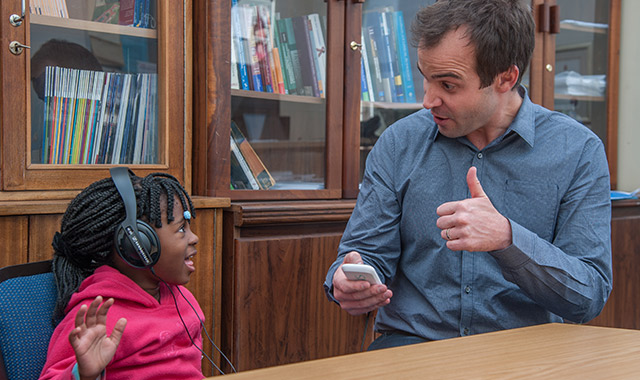
A team of audiologists at the University of Pretoria has developed a mobile health application, hearScreen, which makes hearing screening easy and affordable.
The software application is part of a pilot study in which mobile health technology will be used to do school and community-based screening in Mamelodi, east of Pretoria.
University of Pretoria professor and executive board member of the International Society of Audiology De Wet Swanepoel says “hearing is the cornerstone for developing language, for learning to speak and to communicate”. Early detection of hearing problems in babies and children is paramount. “Even minor hearing defects can have a major impact on language development and the academic performance of children, because they simply get lost within the noisy environs of a classroom.”
In 2012, the integrated school health policy was produced by the departments of health, basic education and social development. It states that the hearing of all South African grade one pupils must be screened. “But with over a million new learners entering the school system every year, this is easier said than done,” says Swanepoel, who served as advisor to basic education in drafting the policy.
He says that screening devices can cost upwards of R25 000, are difficult to handle, and require a level of expertise and training.
Realising that what was needed was an app that could be calibrated on a low-cost cellphone, Swanepoel collaborated with fellow University of Pretoria researcher Dr Herman Myburgh, of the department of electrical, electronic and computer engineering. The pair employed the help of their students to develop and test the app.
Swanepoel says hearScreen adheres to international calibration standards and “can be loaded onto an R800 smartphone”.
“The app can complete the screening test in a minute,” says Swanepoel, “and unlike the older machines we use, hearScreen can continually measure the background noise using the smarphone’s built-in microphone.”
The data can also be uploaded from the device to a centralised management site, where it can be evaluated and the necessary recommendations given.
“To set up hearScreen with the cellphone and headphones is four times cheaper than other screening devices and can be used by anyone that knows how to work a phone,” says Swanepoel. “It also significantly improves and alters current models of school and community-based identification of hearing loss.”
The app has been clinically tested on 800 children in Pretoria as well as a number of old age homes in the Western Cape. The pilot study will also see the app loaded onto the cellphones of community health workers in Mamelodi.
“In South Africa, and in Africa for that matter, we need cost-effective and sustainable methods with which to identify hearing loss early in life,” Swanepoel says. “This is where mobile health technologies such as this app are becoming more and more important in taking healthcare to the people, in places where the infrastructure does not exist.”
The app has now been nominated as a finalist in the innovative research category of the 2014 National Science and Technology Forum Awards, the winners of which will be announced on 3 July. – © 2014 NewsCentral Media

